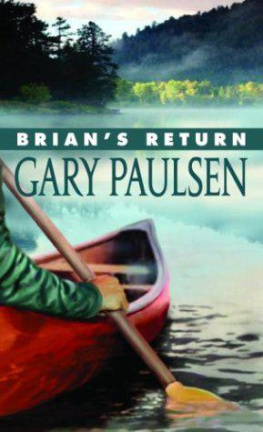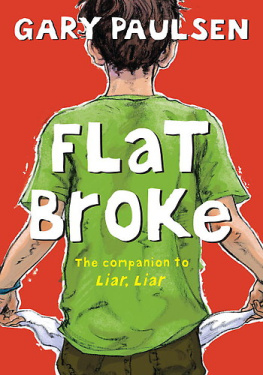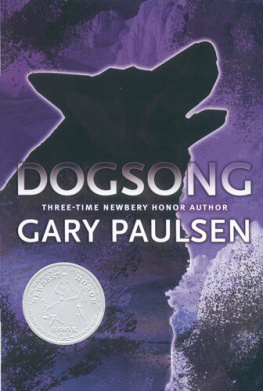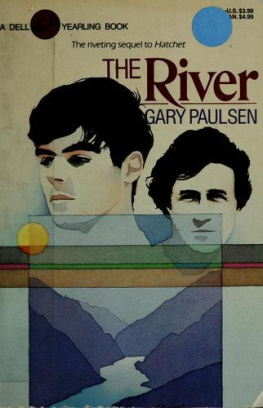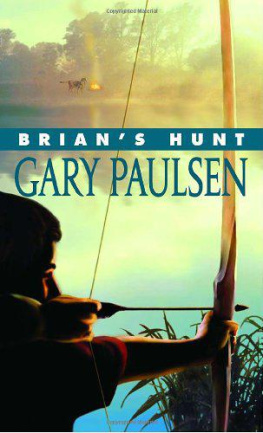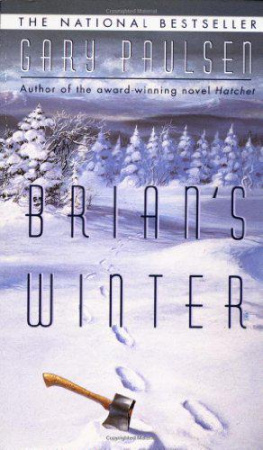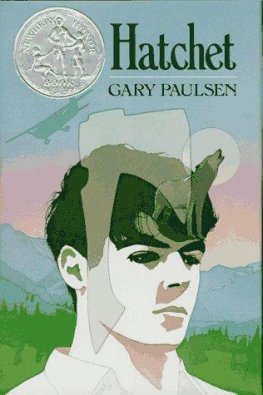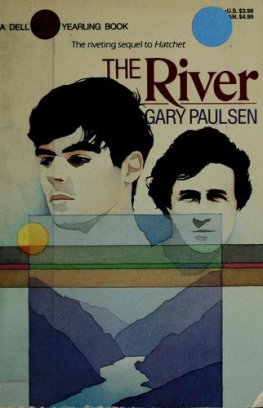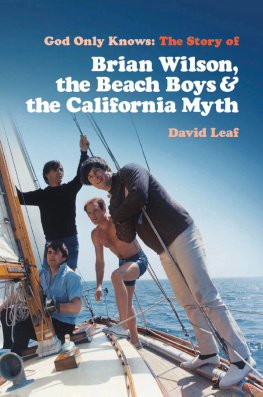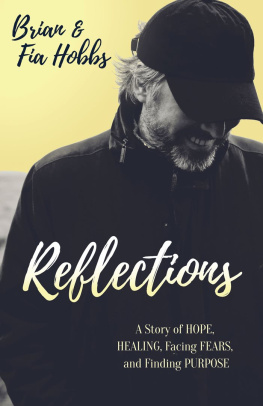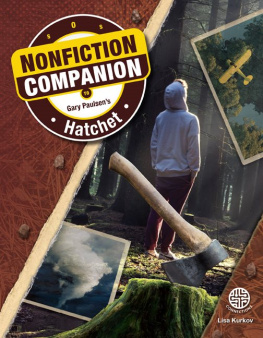
Table of Contents
This book is dedicated to Alana
for taking good care of Linda
The bear dropped to all fours and lunged toward him.
Brian jumped off to the left.
The bear stopped, watched, then lunged to its right, Brians left, heading off Brians movement in that direction.
Brian moved back to his right, trying to get back across the stream.
The bear lunged out into the water, this time to its left, forcing Brian back the other way.
Its pushing me, Brian thought. Its making me go back on the bank. It wants me.
The bear feinted again to the right, pushing Brian back, left, then right, the area getting smaller all the time; Brian kept moving back, pulling the canoe, keeping the canoe between them, zigging and zagging, always back, across the shallow stream and close to the bank on the far side.
The bear was teasing him, playing with him, maybe the way a cat plays with a mouse, back and forth, cutting him off, tightening down on him. Brian felt it rise in him then; he had been afraid, the way the bear was working him, like prey, and that changed to full-blown anger.
No!
A Note About Chronology
Brian was born with Hatchet almost literally. Many readers view him as a nearly real person, someone they wish to know more about, and as a friend. I feel the same way. In answer to requests for more of Brian I have done The River and Brians Winter a sequel and an alternate sequeland this third novel of his return is, again, a response to readers who want to know what happened to Brian later, after he finally came home.
Chapter ONE
Brian sat quietly, taken by a peace he had not known for a long time, and let the canoe drift forward along the lily pads. To his right was the shoreline of a small lake he had flown into an hour earlier. Around him was the lake itself, an almost circular body of water of approximately eighty acres surrounded by northern forestpine, spruce, poplar and birchand thick brush.
It was late springJune 3, to be exactand the lake was teeming, crawling, buzzing and flying with life. Mosquitos and flies filled the air, swarming on him, and he smiled now, remembering his first horror at the small blood drinkers. In the middle of the canoe he had an old coffee can with some kindling inside it, and a bit of birchbark, and he lit them and dropped a handful of green poplar leaves on the tiny fire. Soon smoke billowed out and drifted back and forth across the canoe and the insects left him. He had repellant with him this timealong with nearly two hundred pounds of other gearbut he hated the smell of it and found it didnt work as well as a touch of smoke now and then. The blackflies and deerflies and horseflies ignored repellant completelyhe swore they seemed to lick it offbut they hated the smoke and stayed well off the canoe.
The relief gave him time to see the rest of the activity on the lake. He remained still, watching, listening.
To his left rear he heard a beaver slap the water with its tail and divea warning at the intruder, at the strange smoking log holding the person. Brian smiled. He had come to know beaver for what they truly wereengineers, family-oriented home builders. Hed read that most of the cities in Europe were founded by beaver. That beaver had first felled the trees along the rivers and dammed them up. The rising water killed more trees and when the food was gone and the beaver had no more bark to chew they left. The dams eventually broke apart, and the water drained and left large clearings along the rivers where the beaver had cut down all the trees. Early man came along and started cities where the clearings lay. Cities like London and Paris were founded and settled first by beaver.
In front and to the right he heard the heavier footsteps of a deer moving through the hazel brush. Probably a buck because he heard no smaller footsteps of a fawn. A buck with its antlers in velvet, more than likely, moving away from the smell of smoke from the canoe.
A frog jumped from a lily pad six feet away and had barely entered the water when a northern pike took it with a slashing strike that tore the surface of the lake and flipped lily pads over to show their pale undersides.
Somewhere a hawk screeeeeennn ed, and he looked for it but could not see it through the leaves of the trees around the lake. It would be hunting. Bringing home mice for a nest full of young. Looking for something to kill.
No, Brian thoughtnot in that way. The hawk did not hunt to kill. It hunted to eat. Of course it had to kill to eatalong with all other carnivorous animals but the killing was the means to bring food, not the end. Only man hunted for sport, or for trophies.
It is the same with me as with the hawk, Brian felt. He turned the paddle edgeways, eased it forward silently and pulled back with an even stroke. I will kill to eat, or to defend myself. But for no other reason.
In the past two years, except for the time with Derek on the river, in a kind of lonely agony he had tried to find things to read or watch that brought the woods to him. He missed the forest, the lakes, the wild as he thought of it, so much that at times he could not bear it. The guns-and-hunting magazines, the hunting and fishing videos on television sickened him. Men using high-velocity weapons to shoot deer or elk from so far away they could barely see them, or worse, blasting them from a blind or the back of a Jeep; baiting bear with pits full of rotten meat and shooting them with rifles that could stop a car; taking bass for sport or money in huge contests with fancy boats and electronic gear that located each fish individually.
Sport, they called it. But they werent hunting or fishing because they needed to; they were killing to kill, not eat, to prove some kind of worth, and he stopped reading the magazines and watching the videos. His survival in the wilderness had made him famous, in a small way, and some of the magazines interviewed him, as did some of the hunting and sporting shows on television, but they got it all wrong. Completely wrong.
Boy conquers savage wilderness! some magazines said in the blurbs on the covers. Learns to beat nature
It wasnt that way. Had never been that way. Brian hadnt conquered anything. Nature had whipped him, not the other way around; had beaten him down and pounded the stupidity out of his brain until he had been forced to bend, forced to give, forced to learn to survive. He had learned the most important fact of all, and the one that is so hard for many to understand or believe: Man proposes, nature disposes. He hadnt conquered nature at allhe had become part of it. And it had become part of him, maybe all of him.
And that, he thought as the canoe slid gently forward, had been exactly the problem.
Chapter TWO
If he had to name the final straw that had done it, that had driven him away, driven him back, it would, he thought, have had to be the noise
Another stroke of the paddle and the canoe slithered along the water. It was a beautiful canoe, named The Raft made of Kevlar, sixteen feet long and weighing only fifty-two pounds empty, as smooth as fish skin. It seemed to fit nature as well as wind or water, seemed almost alive.
He had tried. He had tried as hard as he could to fit in, to become normal again. After the fame wore off, the novelty of telling people what had happened, showing them how hed made the first fire, how to make a bow, how to huntwhen all that was done and the world around him had returned to a semblance of normalcyhed tried to fit back in. For a year and more he had actedin his mind anywayas if he were normal.
School. Hed gone back to school and tried to become reacquainted with old friends. They were still friends, glad to welcome him back into their company. The problem wasnt them, it was him.
Next page
